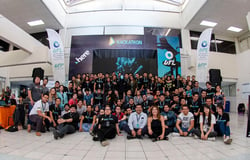The Role
The Cybersecurity Engineer designs and maintains security solutions, conducts threat analysis, vulnerability assessments, and enforces compliance with security regulations.
Summary Generated by Built In
The Cybersecurity Engineer will be responsible for designing, implementing, and maintaining security solutions to protect the organization's information assets. This role involves analyzing potential security threats and vulnerabilities, developing security architectures, and ensuring compliance with security policies and regulations.
Key Responsibilities:
- Design and implement security measures and technologies to safeguard systems, networks, and data.
- Monitor and respond to security incidents, conduct forensics investigations, and provide remediations as necessary.
- Conduct vulnerability assessments and penetration testing to identify weaknesses in the organization's security posture.
- Develop security policies, procedures, and training programs to promote security awareness among employees.
- Collaborate with IT teams to integrate security practices into the systems development lifecycle.
- Stay up-to-date with the latest cybersecurity trends, threats, and technologies to recommend improvements to existing security measures.
Required Skills and Experience:
- Bachelor's degree in Computer Science, Information Security, or a related field.
- 3+ years of experience in cybersecurity engineering or a similar role.
- Strong understanding of security technologies such as firewalls, intrusion detection systems, and encryption protocols.
- Experience with vulnerability assessment tools, SIEM systems, and incident response.
- Knowledge of security frameworks and compliance standards such as NIST, ISO 27001, and PCI-DSS.
- Proficiency in scripting languages such as Python, PowerShell, or Bash for automating security tasks.
- Excellent analytical and problem-solving skills, with a proactive approach to identifying potential security risks.
- Strong communication skills to effectively work with technical and non-technical stakeholders.
Preferred Qualifications:
- Relevant certifications such as CISSP, CEH, or CISM.
- Experience with cloud security practices and securing cloud-based applications.
- Familiarity with DevSecOps practices and tools.
Top Skills
Bash
Encryption Protocols
Firewalls
Intrusion Detection Systems
Powershell
Python
Siem Systems
Vulnerability Assessment Tools
Am I A Good Fit?

Get Personalized Job Insights.
Our AI-powered fit analysis compares your resume with a job listing so you know if your skills & experience align.
Success! Refresh the page to see how your skills align with this role.
The Company
What We Do
Technology consulting and services.










